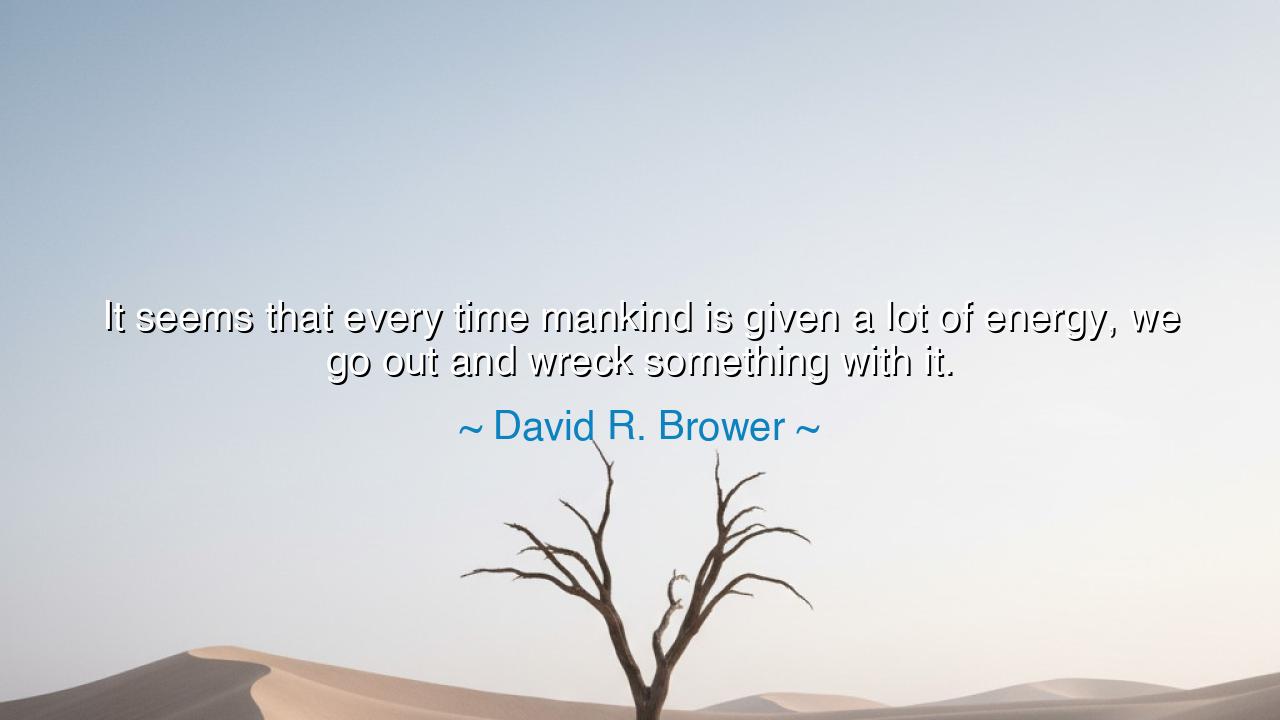
It seems that every time mankind is given a lot of energy, we go
It seems that every time mankind is given a lot of energy, we go out and wreck something with it.






Hear the wary wisdom of a guardian of wild rivers: “It seems that every time mankind is given a lot of energy, we go out and wreck something with it.” In this flint-edged line, David R. Brower names a pattern older than steam and newer than silicon: abundance without discipline turns from blessing to blade. Energy—fire in the hearth, coal in the furnace, oil in the vein, atoms split like thunder—multiplies our reach; but unless the hand is guided by reverence, the reach becomes a rake that scars the earth. The sentence is not a curse on progress; it is a summons to stewardship.
Consider the first bargains we struck with flame. Wood gave way to coal, the black sun buried in seams. We yoked it to engines and made cities hum, then awoke to skies the color of bruises and lungs that learned to wheeze. When oil came—a liquid ladder to speed and wealth—we paved the continent, then salted seas with spills and stirred the very weather with exhaust. The gift grew teeth. Every new store of energy lengthened our lever; too often we forgot to ask where the fulcrum was set, and what got crushed beneath.
Mark a tale of rivers turned to wire. We dammed the wild arteries for light and industry, calling it triumph; we smoothed rapids into reservoirs and measured victory in megawatts. But salmon counted the cost with missing generations, and canyons learned the silence of drowned stone. The current that carried power to our walls also carried silt that starved deltas and fish that never reached their birthplaces. In our haste to master water, we forgot that waters master coasts and peoples alike. Thus energy became a ledger with two columns—one bright, one dark—and we posted only to the first.
Or look to the age when the atom yielded its secret. From that white fire we drew medicines and marvels—and also shadows that fell across cities in an hour. Here is Brower’s warning in its starkest script: when mankind holds concentrated power, our ethics must concentrate faster. A kiloton is a poor tutor in patience; a reactor is a stern teacher of humility. Whether the fuel is fissile or fossil, the lesson abides: what we can do must kneel before what we ought to do.
Yet the proverb is not fated to despair. The same sun that ripens wheat now pours onto rooftops that drink its light; the same wind that once tore sails now spins quiet blades that feed clean current to towns. Where wisdom has paired energy with design—efficiency first, then generation that honors limits—we have seen the pattern bend. Rivers run freer when demand is tamed; grids grow steadier when diversity is loved more than enormity. The harm was never inevitable; it was a choice disguised as momentum.
Let the teaching be carved in the lintel of every workshop: power is innocent; the wielder is not. To keep from wrecking, we must slow the hand and widen the view. Ask, before the switch is thrown: What lives upstream of this decision? What voices will bear its weight? What future will inherit its bill? The old virtues—prudence, temperance, justice—sound quaint beside turbines and chips, yet without them the cleverness of our age is only a faster chariot toward the same old cliff.
So, a rule and a road for our time. First, use less before you make more—the cleanest watt is the one not burned. Second, price the whole truth—let pollution and depletion pay their own fare, and return the revenue to people so fairness walks with rigor. Third, design for repair and return—machines that sip, buildings that breathe, materials that circle home instead of bleeding into land and sea. Fourth, keep scale human—many small, resilient sources rather than a few colossal, brittle ones. Fifth, put nature on the team—wetlands for floods, forests for carbon, rivers with room to meander. Do these with stubborn joy, and Brower’s hard line becomes a guidepost rather than a gravestone: mankind still gifted with great energy, but no longer fated to wreck—instead, strong enough to build and wise enough to spare.






AAdministratorAdministrator
Welcome, honored guests. Please leave a comment, we will respond soon